WAAW 2024: AMR awareness with the young at heart
Posted on February 19, 2025 by Microbiology Society
To mark World Antimicrobial Resistance Awareness Week (WAAW) 2024, the Society asked its Champions to submit their ideas for activities to promote WAAW, alongside our Knocking Out AMR project, in their local communities. There was a huge response, which resulted in a variety of outreach events, resource development and webinars taking place all over the world. In this series of blogs, we catch-up with some of the Champions who got involved. Dr Yinka Somorin, organised interactive sessions with students in schools in Accra, Ghana.
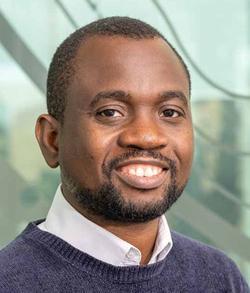
AMR is a global challenge requiring the contribution of everyone from the young to the old. Since education and awareness are crucial for effective AMR mitigation, the most important target groups for AMR awareness include children. Children are quicker to learn and adopt sustainable behavioural changes, as shown in a report by WHO from 2020 (1) and have been identified as influencers and agents of change in their communities, as demonstrated in an article by UNICEF (2).
As a microbiologist and Society Champion, I have been working with fellow researchers, university students and the wider society. However, my engagement with school children brings me so much joy and excitement. Yes, they are the future, and I believe in the power of example – to show them what I do and help them dream bigger about their futures. My daughters, Tee and Dee, are the first to enjoy my power of example. They are so excited about science that they prevailed on me to assist me during my first science outreach as a Champion in Accra, Ghana.
This first session was at Creative Ambassadors Montessori School (CAMS), Accra. I introduced microbiology to the students and how microorganisms impact everyday life. Then, Tee talked about her research on viruses and Dee, who loves creative art, demonstrated to the pupils how to make models of different viruses using playdough. This outreach was well received by the Head of School, students and teachers at CAMS, so much so that they wanted us to come again.
Back to WAAW 2024. To mark World AMR Awareness Week (WAAW) 2024, with the theme ‘Educate. Advocate. Act now’, I organised some activities to educate students, and advocate for action among teachers, parents and students in Accra, Ghana.
Practical training on AMR
This session, held on 19 November 2024 at CAMS, was aimed to help students understand AMR; how bacteria develop resistance to antibiotics; how AMR is transmitted and, discuss actionable steps to mitigate AMR locally. This activity involved 39 students and two teachers. A pre-test survey was deployed to evaluate the students' knowledge of and attitude towards AMR, and included fun facts about AMR, practical demonstrations, group discussions and interactive exercises, to ensure active participation. Hands-on activities were performed to reinforce the knowledge of how antimicrobial resistance occurs in bacteria, using jellybeans (Figure 1a). To demonstrate the genetic basis of antimicrobial resistance, students extracted DNA from banana fruit (Figure 1b). A post-training survey showed that there was an improvement in the knowledge and attitude for 38 out of 39 participants. Promotional materials from the Microbiology Society were given as prizes during the quizzes at the event.
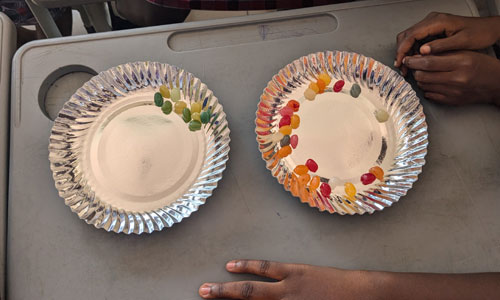
Figure 1a: Jellybeans experiments to demonstrate acquisition of antimicrobial resistance.
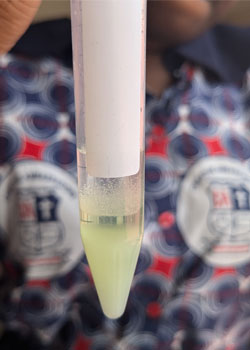
Figure 1b: Student showing DNA extracted from banana fruit.
Whole school awareness on AMR
On 20 November, the event featured a screening to the whole school of the ‘What is Antimicrobial Resistance and how can we tackle it?’ video from the Knocking Out AMR project by the Microbiology Society, with 281 students and 11 teachers present. I introduced the concept of AMR; attitudes and behaviours that promote AMR spread and what actions can be taken at an individual level to reduce the spread of AMR. After the talk, certificates were presented to acknowledge the students and teachers who participated in the practical training the previous day.
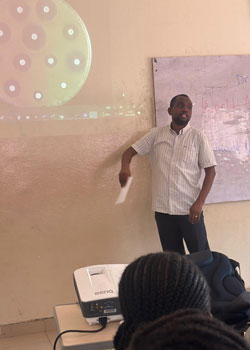
AMR awareness at Lincoln Community School
On 22 November, I raised awareness of AMR at the Village Square, a morning assembly of students, teachers and parents at Lincoln Community School (LCS) in Accra, Ghana. I was joined by Tee and Dee and used WAAW 2024 campaign materials, created by the World Health Organization, to discuss the global challenge of AMR, the implications of AMR on individuals' lives and livelihoods and possible actions that can reduce AMR development.
In the afternoon, I was invited by Tee to the Lunchtime Science Club, which she initiated. At the club, I gave a brief talk on AMR and used the jellybean activity to explain how AMR develops and is transmitted to the 25 students. There was a lot of interest among the students and the teacher for me to return to run the DNA extraction activity, as it aligns with some of the content of their curriculum for primary students.
Reflections
WAAW 2024 provided an opportunity to ‘Educate. Advocate. Act now’ on AMR through the use of videos, posters, hands-on activities and talks to primary and junior high school students, teachers and parents in Accra, Ghana.
It was encouraging to read some of the feedback from participants:
“I write to express my profound gratitude for the practical session and the talk on the World Antimicrobial Resistance Awareness programme for my staff and students. The entire student body, as well as the staff, got sensitised and understood the need to always wash their hands. We are grateful for the certificates for the participants... We hope to see you again for another such beautiful programme” – Mr Samuel Achina, Head of School, Creative Ambassadors Montessori School, Accra, Ghana
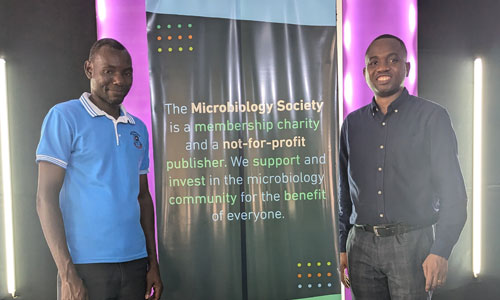
Samuel Achina (left) and Yinka Somorin (right).
“Thank you for coming to teach us. I enjoyed your session. I would like to be a microbiologist in the future” – Student 1
“I think that your presentation was very intriguing. The videos and demonstration caught my attention, the video explained AMR very clearly and showed how this is impacting the world. The demonstration was quick, easy and delicious. I enjoyed doing it. Thank you, Dr Yinka Somorin” – Student 2
“I am a culprit of some of these activities that promote antimicrobial resistance but I will do better from now on.” – Teacher 1
“Most students found the training content relevant and aligned with their current studies. Dr Yinka was highly appreciated for his clear explanations and interactive approach. Students enjoyed the interactive exercises and practical sessions. The majority of students and teachers expressed that the training helped them gain new skills and knowledge that they could apply in their studies and social life. Overall, the training was well-received by the students and teachers, with high satisfaction regarding the content, delivery and interactivity.” – Teacher 2
Many thanks to the Microbiology Society for the support provided to carry out the above activities to mark the celebration of WAAW 2024 in Accra, Ghana. I look forward to further engagements to demonstrate the importance of microbiology and microorganisms to the next generation.
All of the blogs in this series are listed together via our WAAW 2024 blog listings and you can also find out more about the Society's AMR work via our Knocking Our AMR webpages.
References
- WHO Primary and secondary aged school children as “agents of change” to prevent malnutrition and related diseases in Rwanda; 2020 https://www.who.int/about/accountability/results/who-results-report-2020-mtr/country-story/2021/rwanda accessed 18 February 2025
- Pittenger J. Agents of change: Children bring improved sanitation from classrooms to communities; UNICEF 2017 https://www.unicef.org/stories/agents-of-change-lesotho accessed 18 February 2025
